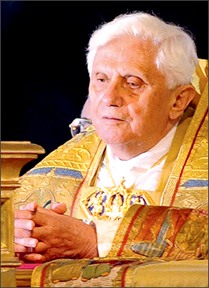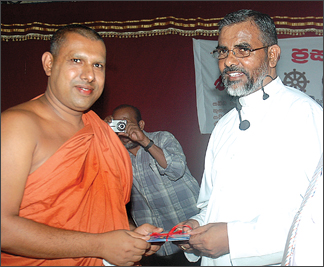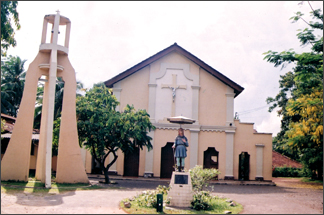|
Christian perspectives
Encourage a passion for truth among communicators - Pope
|

Pope Benedict XVI
|
The Holy Father received participants in a congress promoted by the
Pontifical Council for Social Communications, who have been meeting to
reflect upon the identity and mission of communications faculties in
Catholic universities.
"It is self-evident that at the heart of any serious reflection on
the nature and purpose of human communications there must be an
engagement with questions of truth. ... The art of communication is by
its nature linked to an ethical value, to the virtues that are the
foundation of morality. In the light of that definition, I encourage
you, as educators, to nourish and reward that passion for truth and
goodness that is always strong in the young".
Benedict XVI exhorted his listeners "to promote truth in information,
bringing our peers to reflect upon events, with the aim of being
educators of human beings and builders of a better world. It is also
necessary to promote justice and solidarity, and at all times to respect
the value and dignity of individuals, who have the right not to be
injured in matters concerning their private life".
"It would be a tragedy for the future of humanity if the new
instruments of communication, which allow us to share knowledge and
information more rapidly and efficiently, were not to be accessible to
people who are already socially and economically marginalised"; or if
such instruments were "used to increase the distance that separates
those people from the new networks being developed at the service of
social life, information and learning".
"It would also be a serious matter", said the Holy Father "if the
globalising tendency in the world of communications were to weaken or
eliminate traditional customs and local cultures, especially those that
have managed to strengthen family and social values, love, solidarity
and respect for life".
In this context, he expressed his appreciation to religious
communities which, "despite the high financial cost and the vast human
resources required, have opened Catholic universities in developing
countries".
Recalling how, during the course of the congress, attention had
turned to the matter of the identity of Catholic universities and
schools, the Pope pointed out that "such identity is not simply a
question of the number of Catholic students; it is above all a question
of conviction, of truly believing that only in the mystery of the Word
made flesh does the mystery of man become clear".
"As experts in the theory and practice of communication, and as
educators who are training a new generation of communicators, yours is a
privileged role, not only in your students' lives, but also in the
mission of your local Churches ... to make the Good News of God's love
known to everyone". VATICAN CITY, VIS
Christianity was there from the beginning
Upatissa Attygalle
Most people including a majority of professed Christians believe that
Christianity began when Christ began to preach on earth. But a careful
study of the Bible reveals that Christianity was there from the very
creation of the earth.
The Bible states - 'Then Jesus said to them, "How foolish you are,
how slow you are to believe everything the prophets said! And Jesus
explained to them what was said about himself in all the Scriptures,
beginning with the books of Moses and the writings of all of the
prophets. (Luke 24.25-27) and again - then he said to them (His
Disciples), "These are the very things I told you about while I was
still with you; everything written about me in the law of Moses, the
writings of the prophets, and the Psalms had to come true." (Luke
24.44).
Unfortunately the Jews were unable to identify Jesus as the Messiah
even when Jesus himself preached to them - "If you had really believed
Moses, you would have believed me, because he wrote about me. But since
you do not believe what he wrote, how can you believe what I say?" (John
5.46). Sadly the Jews have still not succeeded in seeing the truth. "The
word was in the world, and though God made the world through him, yet
the world did not recognize him." (John 1.10).
Christianity is Christ, and Christ existed eternally - "Before the
world was created, the word already; he was with God, and he was the
same as God." (John 1.1).
Suneth Gayan with 'Foot Print'
Suneth Gayan Anjelo Perera, an old boy of De Mazenod College, Kandana
has released a CD, titled 'Foot Print' consisting of 14 hymns. Presently
he is a chorister and an Organist at the Udugampola St. Assisie Church.
He extends his sincere gratitude to Rev. Fr. Anjelo Wijewickrema,
Rev. Fr. Lal Pushpadeva the choir of Udugampola Church, Mr. Denzil
Nugegoda who accomplished announcements, parents and family members for
supporting the launch of the CD. Music is composed by him and also
lyrics of seven hymns were written by him. Visharada Saman Nishantha,
music teacher of De Mazenod College, coordinated the production of this
CD.
Rev. Fr. Ponniah Joseph new Auxiliary Bishop, Trinco-Batticaloa
Diocese
Holy Father Pope Benedict XVI, has appointed Rev. Fr. Joseph Ponniah,
Vicar General of Trincomalee-Batticaloa, Sri Lanka, as auxiliary of the
same diocese (area 8,397, population 1,545,129, Catholics 68,174,
priests 66, religious 131). The bishop-elect was born in Thannamunai,
Batticaloa, Sri Lanka in 1952 and ordained a priest in 1980.
Monsignor Ponniah Joseph, born on 12th October 1952, at Thannamunai,
Batticaloa, was ordained a priest on 30th April 1980.
Having done his B.Ph at St. Paul's Seminary, Tiruchirapalli in South
India, and B.Th in the Papal Seminary, Poona, India, returned to Sri
Lanka for the Ordination. Thereafter he did B.A. in the University of
Peradeniya, Licentiate in Biblical Theology at Urbania University, Rome,
and Ph.D in Christian Civilization at the University of Jaffna. He
served at the Parishes of Batticaloa Cathedral, Vakarai, Veechukalmunai,
Aiyithiyamalai, Periya Pullumalai and Thandavanvely.
He was appointed as the Rector of St. Joseph's Minor Seminary,
Batticaloa and served from 1993 to 1996. In 1996 he appointed as a
Lecturer at the National Seminary, Ampitiya, Kandy in 1996 and was
involved in the National Seminary formation and lecturing Sacred
Scripture, Hinduism, Indian Philosophy and Catechetics, until 2001.
He was also a Resource person at the National Institute of Education,
Maharagama, lecturing Religion in Tamil language to the teachers. He was
the Editor of the Diocesan Catholic Paper "Vettappu" and the Diocesan
Bulletin. As a Spiritual Director he assisted the Legion of Mary and
Divine Mercy Apostolates.
He was appointed as the Vicar General of the Diocese of
Trinco-Batticaloa on 19th February 2006 and beside the commitments in
the Diocese, he had been lecturing at the Eastern University,
Vandaramoolai, Batticaloa.
Rev. Fr. Sunil de Silva, Secretary to the Archbishop
The social doctrine of the church and environmental issues
Rev. Fr. Leopold Ratnasekera, Assistant Secretary General, Catholic
Bishops' Conference of Sri Lanka
Much interest and concern are being expressed today about global
warming, green gas effects, gradual disappearance of the rain forest,
melting of the glaciers in the Arctic causing ocean levels to rise,
multi-faceted pollution in our cities, lack of clean water, industrial
waste, change of weather-patterns etc.
Plans are afoot in a bid to arrest their harmful effects on human
life and the planet itself. Sustainable development and good use of the
earth's resources are needed for us to live healthy lives and build up a
prosperous future for humanity. The UN has declared 2008 as the
International Year of Planet Earth. Environment as a matter of important
concern has inspired the Church to formulate a social doctrine that
spells out our responsibility for the earth we live in.
Christian environmental ethics
This vision of a Christian environmental ethic resonates with God's
plan for creation and endows man with an understanding and commitment to
use the goods of the earth with a sense of responsibility with the
common good in view. Chapter Ten of the Compendium treats these
questions under the title: "Safeguarding the Environment".
The major parts of this presentation highlight what the Bible says
about the external world, man's relationship to it and its use, and the
crisis that precipitates with man's erratic dominion over things.
It winds up with discussing the common responsibility towards the
environment as a collective good with special reference to the use of
bio-technology and the need of a change of mentality leading to
adaptation of new life-styles.
There are copious references to the pastoral document of Vatican II
Council: "Church in the modern world" (1966), the encyclical "Progress
of Peoples" (1967) of Pope Paul VI and the much celebrated social
encyclicals of Pope John Paul II: "Sollicitudo Rei Socialis" (1988), "Centesimus
Annus" (1991) commemorating hundred years of Church's social doctrine,
and finally "Evangelium Vitae" (Gospel of Life), 1995.
What does the Bible say about environmental Issues?
The important thesis, that in history we can experience the living
experience of the divine, is the foundation of the faith of the people
of God. A spiritual sense of history enables us to see that God is at
work always.
The world is God's gift to man and all of creation is entrusted to
mankind's responsibility, charging them to care for its harmony and
development (Gen. 1:26-30). In this perspective we see that the
relationship of man with the world is a constitutive part of his human
identity and this relationship is in turn the result of another deeper
relationship between man and God.
He has made the human person a partner in dialogue. For God's people
in the Old Testament, creation was always an object of divine praise.
Further, the definitive salvation offered by God to all humanity through
his own Son, is not realized outside this world. Though wounded by sin,
it is destined to undergo a radical transformation.
From here we take a leap to say that the entrance of Jesus Christ
into the history of the world reaches its culmination in the Paschal
Mystery, where nature itself is involved in the drama of the rejection
of the Son of God and in the victory of his Resurrection.
Jesus inaugurates a new world born of his Resurrection. Reflecting
in this vein, we see that not only is the inner man made whole once
more, but his entire nature as a corporeal being is touched by the
redeeming power of Christ.
Jesus teaches to marvel at the birds
The whole of creation participates in the renewal flowing from the
Lord's paschal mystery, though it still sighs groaning in travail and
awaits the full liberation from corruption (Rom 8:19-23). It is good to
recall how Jesus taught his hearers to marvel at the birds of the air
that neither sow nor reap nor gather into barns, but God provides for
them and at the lilies of the field, which neither toil nor spin but are
arrayed more exotic than Solomon in all his glory (Mt. 6:26, 28).
How does man stand in the universe of created things?
The compendium states: "The biblical vision inspires the behaviour of
Christians in relation to their use of the earth, and also with regard
to the advances of science and technology" (n.456). We all stand in awe
at the continued progress being advanced thanks to the tireless
application of human genius down the centuries, whether in the empirical
sciences, in the technological discipline or the liberal arts.
This accords with God's will and in themselves the achievement of
Science and Technology are positive.
This includes naturally the sphere of molecular biology supplemented
by other disciplines like genetics with its use in agriculture and
industry. What is crucial is the proper application of technology.
The compendium insists: "Scientists, therefore, must truly use their
research and technical skill in the service of humanity, being able to
subordinate them to moral principles and values, which respect and
realize in its fullness the dignity of man" (n.459).
The Compendium warns that we cannot interfere in one area of the
eco-system without paying due attention both to the consequences of such
interference in other areas and to the well-being of future generations.
Quoting Pope John Paul II, it is said that man must not make
arbitrary use of the earth, subjecting it without restraint to his will,
as though it did not have its own requisites and a prior God-given
purpose, which man is indeed called to develop and not to betray (Centesimus
Annus, n.37).
Overcoming the crisis regarding environment
The Church sees the crisis in the relationship between man and the
environment Church as man's pretension of exercising unconditional
dominion over things, heedless of any moral considerations which, on the
contrary, must distinguish all human activity.
This upsets the balance between man and his environment. Nature is
not a mere instrument in human hands to be manipulated by means of
technology. Such an approach is reductionist in the sense it views the
natural world in mechanistic terms and sees development in terms of
consumerism.
This leads to serious forms of human alienation. However, we must
insist that such attitudes do not arise from scientific and
technological research but from scientism and technocratic ideologies
that tend to condition such research.
The advances of science and technology
The Compendium elaborates: "The advances of science and technology do
not eliminate the need for transcendence and are not of themselves the
cause of the exasperated secularization that leads to nihilism. With the
progress of science and technology, questions as to their meaning
increase and give rise to an ever greater need to respect the
transcendent dimension of the human person and creation itself" (n.462).
Further it explains that: "A correct understanding of the environment
prevents the utilitarian reduction of nature to a mere object to be
manipulated and exploited. At the same time, it must not absolutize
nature and place it above the dignity of the human person himself"
(n.463).
This is a subtle form of divinization of nature. This results in the
ontological and axiological difference between human beings and other
living beings getting eliminated: a consequence of a concept of
environment based on eco-centrism and biocentrism, an egalitarian
consideration of the dignity of all living things detrimental to man's
superior responsibility.
In our era there is a tendency to foster a vision of man and things
that is sundered from any reference to the transcendent, leading to the
rejection of the concept of creation and to the attribution of a
completely independent existence to man and nature.
The bonds that unite the world to God are thus being broken.
Consequently, this ruptures link between man and the world,
impoverishing human dignity itself. The kinship between man with the
creaturely environment is transparent in the spiritualities promoted by
the Benedictine and Franciscan traditions calling for respect of every
reality of the surrounding world.
Pope John Paul II spoke about the need to place ever greater emphasis
on the intimate connection between environmental ecology and "human
ecology" (Centesimus Annus, n. 38).
Thus to tide over the crisis between man and environment, the orderly
nature of creation hast to be accepted which guarantees harmony, secures
man's transcendence and places squarely upon him his responsibility of
creative use and investment of the forces and energies of nature.
Continued next week
|

Mage Hada Raja Jesus, a CD and a cassette produced by Rev.
A.J. Joseph was launched recently at the Divine Good News
Centre of Jesus Never Fails at Battaramulla. Here, he
presents the first CD to Ven. Dr. Handungama Hemaloka Thera,
Incumbent of Nawala Wickramasinharama Temple. Rev. Fr. Anura
Perera and Mawlavi M.T. Holobbi were also present. Picture
by Saman Sri Wedage |
|

The annual church feast of St. Issidore’s Church,
Thibbotugoda, Horagolla will be held on June 01, 2008. This
Church was established in 1886 by Archbishop Rt. Rev.
Bonjean. At that time Tibbotugoda belonged to the
Midellawita Parish. Rev. Fr. Gallo Balma constructed a new
church for parishioners between 1962 and 1970. Parish Priest
Rev. Fr. Blase Cooray has organised the festive
celebrations. The precession will move through paddy fields
blessing them and finally return to the church. |
|

